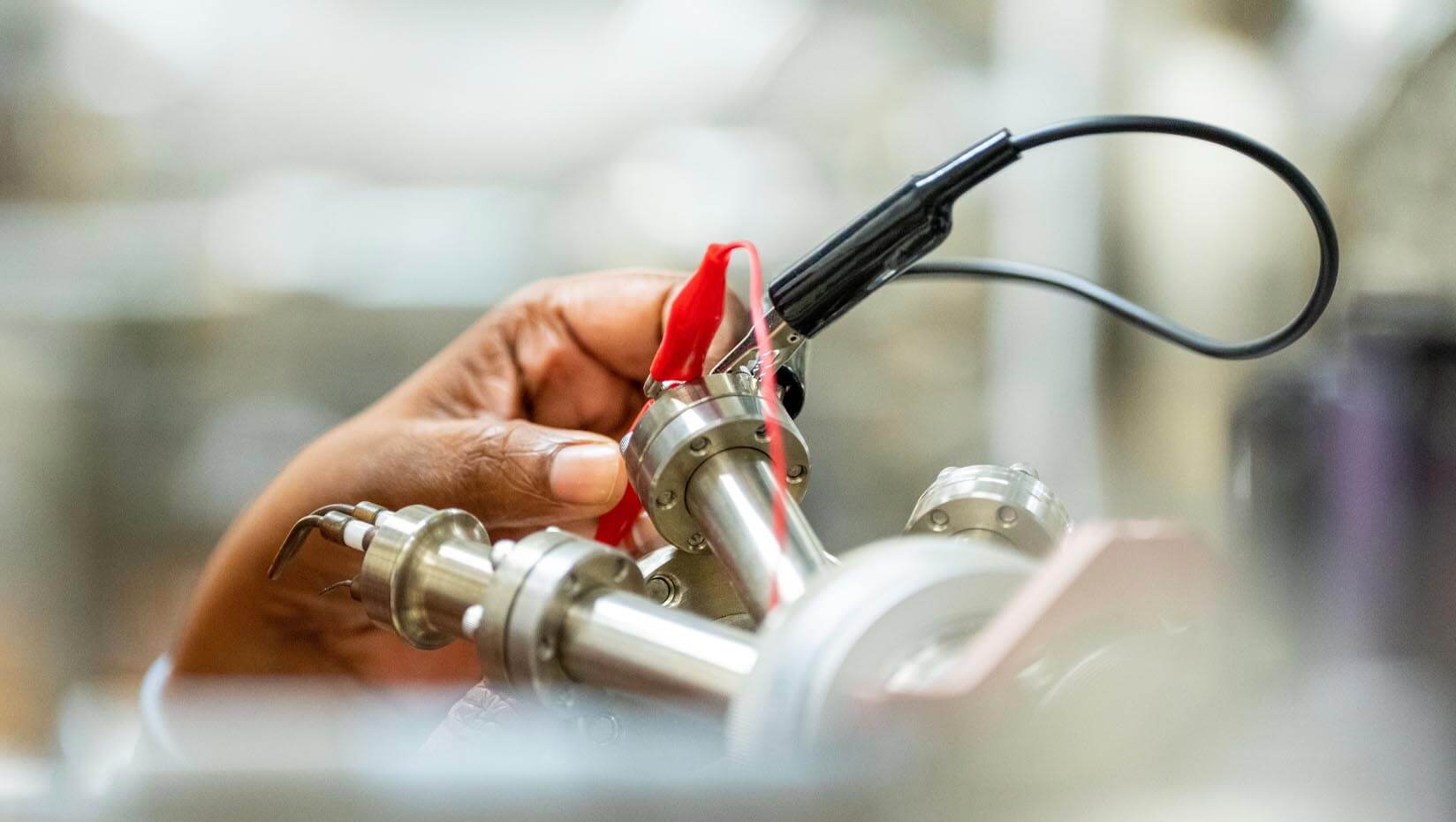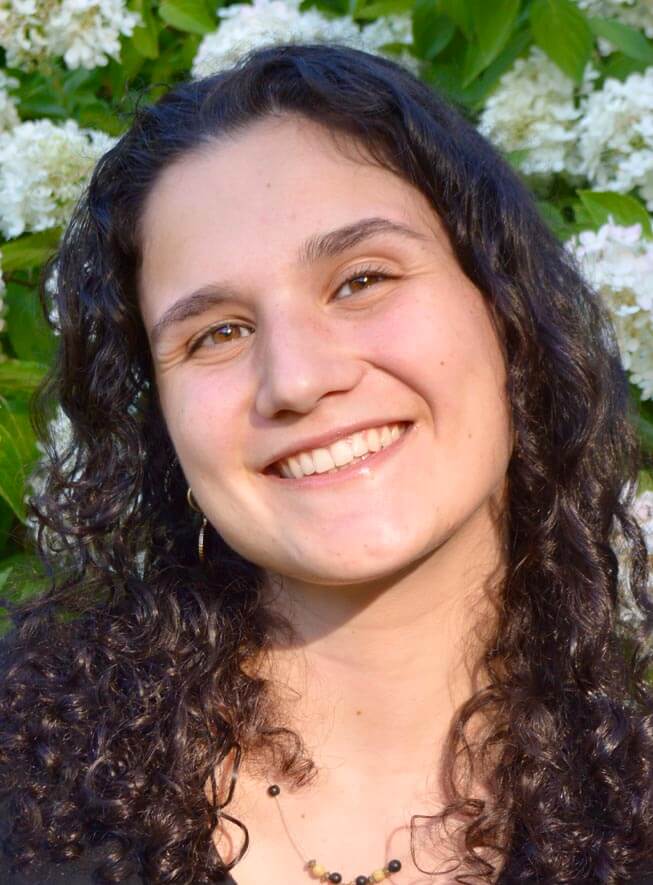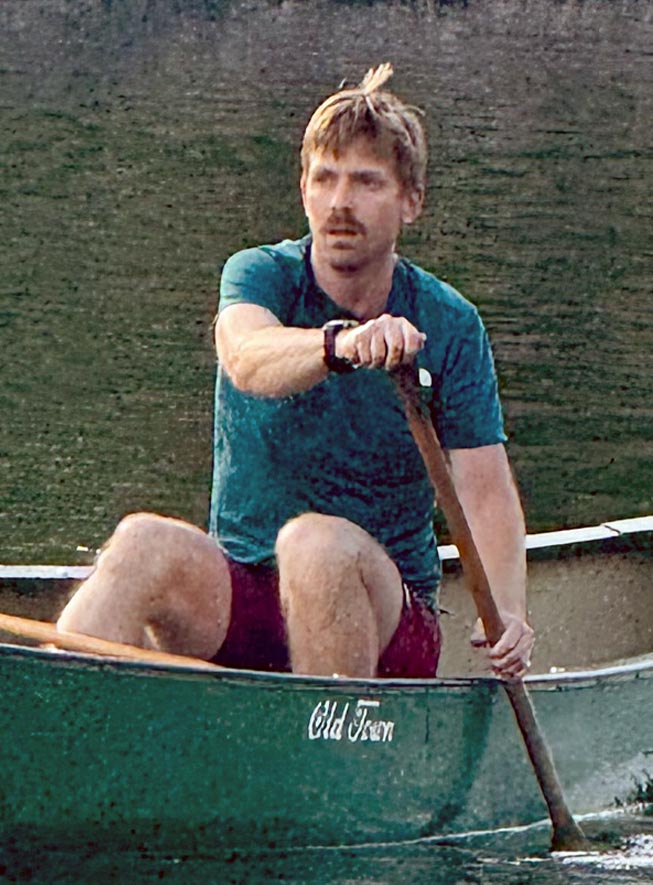
Two undergraduates named ‘25 Goldwater Scholars for STEM research excellence
University of Maine seniors Esther Biro and Gus Hoy have been named 2025 Goldwater Scholars for their research excellence in the fields of the natural sciences, mathematics and engineering. Each will receive as much as $7,500 for tuition, books and room and board that helps them continue to pursue research.
Biro, a biochemistry major, and Hoy, a mechanical engineering major, are two of 441 college students nationwide who received the award for the 2025-26 academic year, according to the Barry Goldwater Scholarship and Excellence in Education Foundation website. This year, there were 1,350 nominees from 445 academic institutions.
In the last nine years, UMaine has had eight Goldwater Scholars — six in the natural sciences and two in engineering.
In honor of the former U.S. Sen. Barry Goldwater, the scholarship supports undergraduate students who demonstrate potential to lead the nation in STEM research. UMaine students are nominated to participate in the national selection by a faculty committee led by Robert Wheeler, professor of microbiology, and Melody Neely, associate professor of molecular and biomedical sciences, and supported during the application process by the Office of Major Scholarships.
“Gus and Esther are both exceptional scientists who bring curiosity, intensity and creativity to their projects,” Wheeler said. “It was a privilege to work with them both to highlight their accomplishments and future goals in their applications. We are incredibly proud to play our parts and train these future leaders in materials science and biomedical research.”
Students interested in applying for the upcoming cycle of the Goldwater Scholarship should email the Office of Major Scholarships: Nives Dal Bo-Wheeler at nives.dalbowheeler@maine.edu. The internal application deadline is set for November.
An informational session is scheduled for Monday, October 16 at noon. The location will be determined at a later date and posted on the Office of Major Scholarships website.
Contact: Ashley Yates; ashley.depew@maine.edu and Nives Dal Bo-Wheeler; nives.dalbowheeler@maine.edu
Esther Biro
A member of the UMaine Honors College and Department of Molecular & Biomedical Sciences, Biro is also minoring in chemistry and Spanish. From her first semester on campus, she participated in research as part of the first-year Phage Genomics course.
“It feels so surreal to be able to perform important research at an undergraduate level,” Biro said. “When I am running an experiment, every microscope image and every cell matters.”
Having grown up in Louisville, Kentucky, Biro said she has always loved snow and been drawn to the Northeast. What brought her to the University of Maine was its biomedical science department and what she deemed “the most beautiful campus I’d ever seen.”
In her second year at UMaine, she immersed in immunotoxicology research with Julie Gosse, associate professor of microbiology. After Biro graduates in the spring, she plans to pursue a doctorate in the biomedical sciences.
“In high school, apparently just for fun, she mastered Discrete Math and Calculus 3 via courses at the University of Louisville,” Gosse said. “Immediately upon joining my lab, she started searching for funding opportunities and secured one I’d never heard of to support her summer 2024 research. She’s been a great team player and brilliant researcher, and I have no doubt she’ll be successful in graduate school next year.”
What motivated you to pursue the Goldwater Scholarship?
I decided to apply for the Goldwater Scholarship after attending an information session with the Office of Major Scholarships. I thought applying would be a useful experience no matter what happened! The Office of Major Scholarships was an incredible resource during the whole process.
How will the scholarship benefit the research you are currently conducting?
The Goldwater application required me to think very critically about why I was working on my research project, as one of the biggest components is the research essay. Having such an in-depth understanding of my project has in turn helped immensely for other applications and presentations. Science communication is an important aspect of research, and the Goldwater has allowed me to work on that skill.
Have there been other students who supported and inspired you or exposed you to something new?
The support system of students is one of the most wonderful parts of going to UMaine. I am constantly in awe of the accomplishments of my peers. It has been so rewarding to be a part of an environment that fosters such achievement and community.
Have you collaborated with a mentor, professor or role model who made your time at UMaine better, and if so, how?
I have been so fortunate to have so many wonderful professors in my time here. My mentor and research advisor, Dr. Julie Gosse, has offered me support at every step of my journey at UMaine. I joined her lab my second year of undergrad, and I was immediately immersed in the world of immunotoxicology. She pushes me every day to be the best scientist I can be and always encourages me to do more. I am so incredibly grateful to work with her.
Why did you choose to study at UMaine?
Even though I grew up in Kentucky, I have always been drawn to the Northeast; I love snow! UMaine not only had one of the most beautiful campuses I’d ever seen, but also an incredible biomedical science department. What set UMaine apart was how much students were encouraged to learn through doing. I was able to start participating in research from the very first day I set foot on campus in the bacteriophage genomics course. This helped me realize my love for research much earlier than I would have otherwise.
What has coming to UMaine enabled you to explore beyond academics?
The outdoors of Maine!
Have you had an experience at UMaine that shaped or changed how you see the world?
It feels so surreal to be able to perform important research at an undergraduate level. When I am running an experiment, every microscope image, every cell matters. UMaine has taught me just how critical these small details are. Every tiny step forward matters.
Describe UMaine in one word and explain.
Uplifting.
This school is filled with the kindest, most encouraging people you will ever find. Everyone is cheering for you and is there to help you back up when you fall. The strength of the community here is UMaine’s greatest asset.
What’s on the horizon? What are your plans for after you graduate?
After I graduate in the spring, I plan to attend graduate school and obtain a Ph.D. in the biomedical sciences!
Gus Hoy
Hoy, from Solon, a small town north of Skowhegan, Maine, is a member of the Department of Mechanical Engineering and minoring in mathematics and physics. The Goldwater scholarship gave him financial support to continue his research over the summer.
“I have been fortunate enough to work on four different research topics, and I am constantly inspired by the diversity of strengths and ideas from the other members of each group,” Hoy said.
His research on high temperature electrolyzers was inspired by Dong Ding, a professor at the Idaho National Laboratory, and Hoy has found collaborative opportunities in this field with Xiao-Dong Zhou, a professor at the University of Connecticut’s Center for Clean Energy Engineering. At UMaine, Hoy has worked with Nicholas Bingham, assistant professor of physics, and Philip King, assistant professor in mechanical engineering.
Bingham said Hoy’s current research in the field of hydrogen detection has the potential to advance hydrogen economy research and improve detection limits.
“In the short time I’ve worked with Gus — just eight months — he has proven to be a dedicated, motivated, and highly capable researcher. He consistently shows deep commitment to his project and to the lab as a whole,” Bingham said. “His enthusiasm for the hydrogen detection project and the broader hydrogen economy is inspiring.”
Hoy plans to pursue his passion for clean energy technologies and continue his research on high temperature electrolyzers as a doctoral student in the U.S. or abroad after graduating in the spring.
What motivated you to pursue the Goldwater Scholarship?
The Office of Major Scholarships brought the Goldwater Scholarship to my attention with one of their emails to the student body. I am very interested in pursuing a Ph.D. and performing cutting-edge research on green energy systems, so I thought I would be a good candidate for the Goldwater Scholarship.
How will the scholarship benefit the research you are currently conducting?
This scholarship has given me the financial freedom to continue my research over the summer despite the current uncertainty with research funds. It also makes me a more competitive applicant for top graduate schools. One of my top-choice research advisors has already responded to a cold email and was very positive about my chances of getting into the program when we met over Zoom.
Have there been other students who supported and inspired you or exposed you to something new?
I have been fortunate enough to work on four different research topics, and I am constantly inspired by the diversity of strengths and ideas from the other members of each group. As an undergraduate researcher, I appreciate the exposure to many different points of view.
Have you collaborated with a mentor, professor or role model who made your time at UMaine better, and if so, how?
Dr. Dong Ding at the Idaho National Laboratory (INL) started me on my current path to study high temperature electrolyzers. Working with his group gave me the confidence to pursue research positions at UMaine and start considering a graduate degree. At the Center for Clean Energy Engineering at University of Connecticut, I was fortunate to work with Dr. Xiao-Dong Zhou, who has supported my research with his expert advice and collaboration.
At UMaine, Dr. Nicholas Bingham has exposed me to Materials Science in his thin-film laboratory, and Dr. Philip King advised me on research for innovations in additive manufacturing technology. Both have been encouraging to my early attempts at research and helped me create exciting projects, which I have presented at the UMaine Student Symposium. I have enjoyed and benefited from the mentoring of all the professors here at UMaine, and I particularly enjoy the advice and conversations I have had with my academic advisor, Dr. Zhihe Jin.
Why did you choose to study at UMaine?
UMaine is close to home, and it also has a very strong engineering program. I am only an hour from my parents’ house and enjoy going to see them from time to time.
What has coming to UMaine enabled you to explore beyond academics?
Recently, I have taken up canoeing. I feel very fortunate to live so close to the Penobscot River here in the Old Town/Orono area.
Have you had an experience at UMaine that shaped or changed how you see the world?
My former UMaine MEE academic advisor Dr. Yingchao Yang introduced me to Dr. Dong Ding at INL and informed me of the Department of Energy Science Undergraduate Laboratory Internship, which allowed me to go work at one of our national laboratories. The next summer Dr. David Dvorak informed me about the National Science Foundation Research Experience for Undergraduates program, which brought me to the University of Connecticut where I met Dr. Xiao-Dong Zhou. Both these opportunities helped set me on my current path: applying for a doctoral program performing research on electrochemical cells.
Describe UMaine in one word and explain.
University.
Universities are wonderful. Universities produce one of the most exciting products our great country has to offer: education. They offer us insight into our physical world; they promote arts and challenge norms; they produce new technologies; they draw a diversity of cultures and ideas into the same arena; and they prepare young adults to contribute to society.
What’s on the horizon? What are your plans for after you graduate?
On the horizon we see the interface of our warming atmosphere and the gentle curvature of the solid ground we live on. My plan is to continue studying the clean energy technologies I am passionate about, so I am applying for Ph.D. programs at home and abroad.


